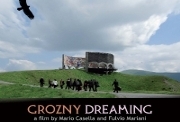
A multi-ethnic orchestra with artists from different regions of the Caucasus; their dreams of performing in this tormented region and demonstrating the possibility of peaceful coexistence. Our interview.
In their documentary Grozny Dreaming, Swiss directors Mario Casella and Fulvio Mariani follow the tour of the Caucasian Chamber Orchestra, presenting the lives of the musicians, the joys and challenges of a musical project difficult to realize in a region plagued by war and to conflicts.
Mario Casella, can you tell us what inspired two Swiss directors to film a group of musicians living in the Caucasus?
There are two reasons. The first reason directly concerns my professional profile; I am a director but also a journalist. I have always dealt with foreign policy and, in particular, the Balkan countries and the Russian Federation, a region that interests me a lot. The second reason is linked to the mountains of the region: Fulvio and I are passionate mountaineers. In the past we have made films about mountains, related not only to mountaineering but also to culture. The road took us to the Caucasus and we fell in love with the landscapes and untouched valleys.
The film was made in 2007, that is to say before the Russian-Georgian conflict last August. What is currently happening with the Caucasus Orchestra Chamber?
Unfortunately, the news is not good. The Last Georgia Crisis occurred around the time the film was released. At that time the orchestra was in Europe, in Venice and Verona, for film tours and concerts. Some musicians could not return to Georgia because they had Russian passports; their return home has become much more difficult.
The orchestra has not disbanded but no longer has the status of a permanent orchestra, which means that the musicians do not receive regular salaries. There is a lack of financial support. In this crisis, the orchestra had to interrupt its regular activity. Now, musicians only come together for specially scheduled events.
In the documentary, the orchestra goes on a trip. What is its route, where does it start and where does it end? What is the meaning of this journey?
The initial idea was to do a peace tour through the Caucasus; visit as many countries as possible, both in the south and north of the region. The film follows the orchestra’s travels and depicts the difficulties of traveling to different countries. The orchestra could not visit certain countries and so we followed the conductor. He tried in vain, in Azerbaijan and Abkhazia, to negotiate with the authorities for authorization to perform. The final goal was to conclude the tour through the Caucasus with performances in places symbolizing Caucasian conflicts, such as Grozny and Beslan. It was not possible to perform in Grozny. In the film we explain why it was not possible to play there and how Chechnya remains an open question.
Can the film be defined as a road movie? What were the main production challenges?
There are two narrative levels in the film. The first level follows a classic documentary technique of telling the stories of these musicians. We film their daily life. We show, for example, the difficulty of living in Tbilisi for a Russian musician married to a Georgian, or the troubles of a Georgian who cannot leave his country. None of this has anything to do with the road movie style; but then, when we follow the orchestra on the bus across the Caucasus, the road accompanies the narration.
The main challenges concerned logistics, organization and bureaucracy. Making a film with an orchestra that has to cross the Caucasus is much more difficult than in Europe, where border controls no longer exist. There are also unknowns. Until the last moment, we didn’t know if we would be accepted or rejected in certain countries. We were surprised both by certain receptions and by certain refusals. For example, we managed to play just a few kilometers from Tskhinvali and beyond the last Georgian military checkpoints.
The film contains images of the conflicts that have ravaged the Caucasus in recent years. What is their significance in relation to your story?
There is certainly a didactic and explanatory aspect, because the current problems of the Caucasus cannot be understood without considering history. To better understand the origins of the problems and the utopia promoted by the orchestra, we offer a historical perspective.
Was the film released in Switzerland?
Yes, the film is already showing in Italian Switzerland and will soon be shown in German and French-speaking Switzerland. The film was selected to be screened during the Solothurn Film Days, the most important film event in Switzerland. We hope to find a distributor in Italy soon.


